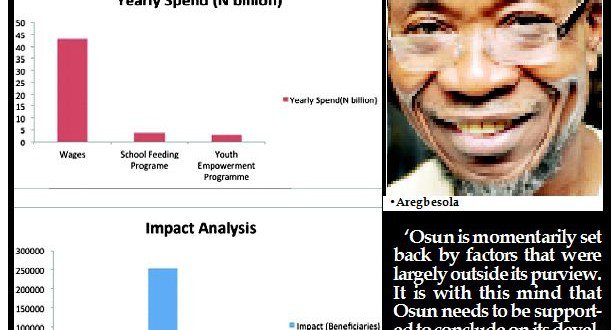
OPINION: Putting Osun’s Salary Challenge In A Fairer Context
 Osun State government has remained in the news for some time over its inability to pay workers’ salaries. An economist, John Ogunlela, properly situates the challenges facing the government
Osun State government has remained in the news for some time over its inability to pay workers’ salaries. An economist, John Ogunlela, properly situates the challenges facing the government
The Osun financial challenge is an unfortunate one for which thousands of workers are in a difficult situation as to their sustenance. It is a challenge for which no excuse is justifiable and arguably poses leadership’s toughest test.
The Osun State government is taking its bull by the horn in this regard. While the administration is most saddened by this heart-rending situation, it is working hard to restore Osun to the rather comforting normalcy of people-centred development that the state has in recent times been symbolic of.
The administration is working with its partners to streamline its obligations and expenditures, boost its revenue so as to deal decisively with this problem and in so doing, champion a model for other states and the nation.
The challenge predominantly affects around 35,000 state civil service workers, whose salary arrears of about six months are owed. Teachers and local government workers are to a large extent least affected by this situation.
Concisely, the state civil service represents around one per cent of the population and takes up wages to the tune of N3.6 billion per month. This adds up to a yearly bill of N43.2billion that represents at least 70 per cent of the government’s statutory revenue. This wage bill largely bloats the recurrent expenditure at the expense of development programmes for the remaining 99 per cent of the population. This lopsided spending between recurrent and capital expenditure is unfortunately common across the country and is one needing of a bold solution. In the case of Osun, it is not unconnected to the legacy of a bloated government inherited since its creation in 1991.
While this delay in arrears has its attendant effect on the state’s economy, the notion that this problem affects majority of the population is somewhat incorrect. According to RENCAP’s 2014 report, Osun’s Gross Domestic Product (GDP) is N1.9 trillion. The state civil service wages of N43.2 billion is therefore 2.3 per cent of Osun’s GDP. What this simply implies is that there are other sectors that contribute principally to the sustenance of the economy. This would probably explain why the situation, as sad as it is, has not degenerated to that of social chaos.
In general, the mood in the state currently is largely that of supportive concern as the administration is one that has been given to populist and innovative development, the kind of which the people had hitherto not experienced. The government champions the only surviving school feeding scheme in the country, which benefits 252,000 school children at a yearly cost of just N3.5 billion.The scheme has been hailed by development institutions from far and near as a cost-effective silver bullet to tackling the challenges of education, malnutrition and empowerment that bedevil millions of households in Nigeria and the developing world at large.
In Osun, the scheme has proven to be a means of critical support to hundreds of thousands of families, sustains 3, 007 community caterers, thousands of small holder and commercial farmers.
Osun also pioneered a social welfare programme that engages youths in community service, capacity development in return for a monthly stipend of N10,000 each. The scheme, called OYES engages 20,000 youths in a two-year rolling scheme at a yearly cost of just N3 billion.
Today, OYES has proven to be another cost-effective means of empowering the grassroots economy to such an extent that it’s been adopted by no less than the World Bank as the template for its own National Youth Empowerment Scheme called YESSO. The scheme has directly benefited 40,000 youths and indirectly tens of thousands of households across Osun.
The people, being beneficiaries and witnesses to this unusual people-centered development in the last few years, are therefore in a high state of concern and enthusiasm to see the state overcome it’s current predicament and return to its usual business of delivering to the people.
The Osun salary arrears challenge is a symptom of a larger national problem, which affects governments at all level and was occasioned by multiple factors outside the single control of any one government. Osun State and its people have been lopsidedly vilified as the face of this challenge in such a way as to appear that the state is the architect of the problem. It is therefore important to place this problem in a more appropriate context so as to allow for a genuine resolution for Osun, other states and the nation at large.
How we got here
In Osun, three keys factors contributed to the current problem.
•2012: The demand for ‘blanket’ implementation of minimum wage increase.
•July 2013 : The 40 per cent crash in statutory allocation due to alleged oil theft of 400,000 barrels of crude per day.
•June 2014 : The 50 per cent crash in the global price of crude oil and impact on statutory allocation.
The minimum wage increase of 2012 came with its blessings and challenges. The Federal Government negotiated a uniform minimum wage for the nation without due consideration for the varying earning capacities of the constituent states. Thus, creating a situation where top-earning states like Akwa Ibom, were to pay the same minimum wage as Osun that earns a fraction of Akwa Ibom’s revenue.
The administration in Osun being pro-worker in origin, nonetheless sought a minimalist and literal implementation by increasing wages for the lowest earning cadre of the civil service and augmenting the remaining level in order to maintain seniority in level and an affordable wage bill to government. The unions refused this arrangement for affordability, rather demanded for a proportional increase across board.
This led to an increase in wages from N1.7 billion per month to N3.6 billion, more than a 100 per cent increase. This arbitrary increase occasioned by the Federal Government’s negotiation of a unitary minimum wage for all states regardless of their earning capacity signaled the beginning of major disturbances in the state’s finances.
In retrospect, perhaps the state could have been harder in enforcing its implementation of minimum wages. This was one factor that was within the control of the state although the consequence of such action could have proven costly.
By July 2013, the Federal Government had declared that the country was losing 400,000 barrel of crude per day to oil bunkering. The immediate effect of this to states was that statutory allocation suffered a 40 per cent reduction, which further destabilised the state’s budget. It was bad enough that any reduction threatened the funding and delivery plans of any serious government, much worse it was that the 40 per cent reduction in revenue didn’t add up. The country produces around 2.6 million barrels a day. The theft of 400,000 barrels should translate to 15 per cent reduction. Osun, like other states, experienced a 40 per cent reduction and the Federal Government gave no explanation for this. This anomaly among other funding concerns led the governor to raise an alarm on the 16th of February 2014 edition of Vanguard Newspaper about the dangers of the situation to the nation. Please see http://www.vanguardngr.com/2014/02/nigeria-war-situation-aregbesola/
In June 2014, the macro economic event of the crash in international price of crude occurred. Prices crashed by as much as 50 per cent and a similar reduction was transferred to statutory allocation. This led to a further depletion in statutory revenue. In average Osun suffered at least a 56 per cent reduction in its revenue in this period and this impacted the state’s development and wages obligations.
The oil bunkering issue and the attendant effects on states’ revenue was exclusively a federal matter, while the drastic crash in crude oil prices was a macro-economic disaster. Both factors were totally out of the purview of the state. The response of any state to such issues should have been to downscale activities as much as possible, which Osun did. The government subsequently slowed down efforts on some projects in order to cushion the effects of this challenge. It is pertinent to highlight that regardless of the good intentions of the state, its handling of the blanket minimum wage increase following union pressure, if avoided, could have reduced the effect of the fiscal woes being experienced.
While, it can be argued that this could have further cushioned the effect of the challenge, nonetheless, it also could have proven somewhat costly to manage in social and political terms. It is instructive that at the heart of this unfortunate development lie the critical structural problems in government. It is with this in mind that it must be noted that the nation will have to tackle the challenge of bloated government head on, if we are to decisively deal with this matter now.
The government in Osun, given its progressive origin, did not rely only on the statutory funds to drive its development agenda. The state has been ramping up on Internally Generated Revenue (IGR) from the administration’s inception. Osun’s concerted efforts in this regard, since 2010, has translated to a 200 per cent increase in IGR, one of the highest increase in its economic zone.
However, this IGR increase was not enough to radically drive economic growth. Osun cannot exclusively rely on its IGR to fund personnel costs for now.
In fact, an increase in IGR can only be as quick as the growth of the economy and Osun for most of its 24 years of existence as a state has suffered weak economic growth, lacking the critical social and physical infrastructure required to become vibrant.
Thus, to radically increase IGR, Osun will need to expand the economy; to expand the economy, Osun needs to build social, physical and business infrastructure.
So, from November 2010, Osun became synonymous with radical, bold and innovative socio-economic infrastructure programmes. Some of these include:
•Agri-business reform – The programme led to the emergence of one of the largest poultry producers in the country in Osun.
•Aggressive development of road infrastructure – Highways, inter and intra-city road networks to aid trade and development of industry.
Education reform
•Development of model school infrastructure – No fewer than 252,000 children are benefitting from the school feeding scheme.
• Opon Imo – The electronic learning (e-learning) tool targeted at 150,000 high school pupils.
• Teacher training – Training and retraining programmes from teachers in public schools.
• School uniform harmonisation – This policy led to the emergence of the largest garment factory in West Africa.
Therefore Osun, in its quest for strategic diversification of the economy, could not undergo a swift weaning from statutory allocation as it lacked the economic base for a quick and proportional ramp up of IGR. This informed the bold efforts by the administration to invest in the needed infrastructure to boost the economy.
Implementing infrastructure development required huge resources. The cost of wages has historically taken a large chunk of government spending in this space, Osun and the nation at large. The previous administrations in the state had consistently shied away from filling the infrastructure gap that the state so badly needed to be economically viable.
The incumbent administration sought to act decisively by devising new means of leveraging regular although marginal revenue to access low-cost and long-term funds called bonds. Thus, the government accessed bonds at the early days of this administration, based on revenue projections, which understandably, did not capture the mishaps from 2012. Unfortunately this meant the state also had obligations to it creditor which would not have been a problem when the projections were made.
But, for the unexpected and unfortunate national problem of oil theft and the macro economic disaster of 50 per cent reduction in oil prices, Osun would now be celebrating the actualisation of its well thought-out socio-economic rejuvenation without any problem of meeting its wages and other obligations.
Man proposes and God disposes, Osun is momentarily set back by factors that were largely outside its purview. It is with this mind that Osun needs to be supported to conclude on its development agenda, some of which are widely seen as a model for people-focused development for the nation.
The people of Osun know this and so do the men and women of reason in our nation. Leadership is for time of crisis. Osun’s finest moment is yet to come. By the grace of God, Osun will champion an admirable way out of this, for the benefit of its people and the nation at large.
THE NATION



